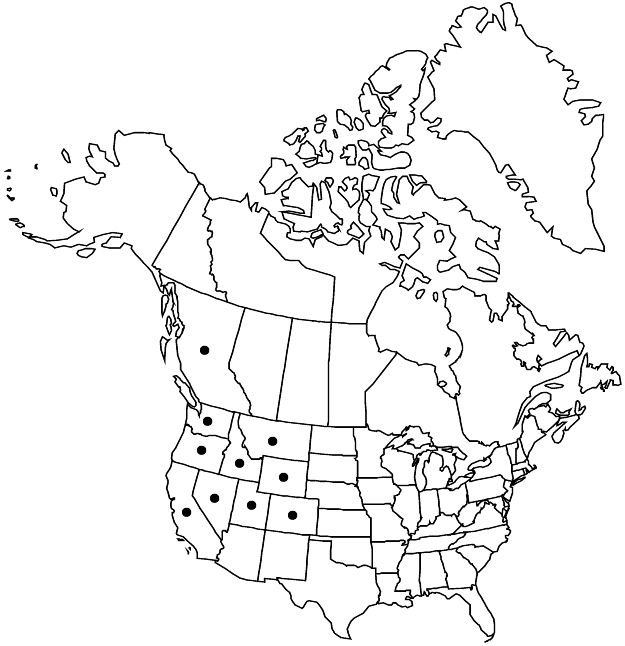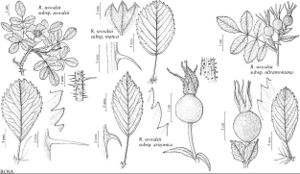Difference between revisions of "Rosa woodsii subsp. ultramontana"
Canad. J. Bot. 56: 189. 1978.
FNA>Volume Importer |
FNA>Volume Importer |
||
| Line 15: | Line 15: | ||
|label=Selected by author to be illustrated | |label=Selected by author to be illustrated | ||
}} | }} | ||
| − | |basionyms={{Treatment/ID/ | + | |basionyms={{Treatment/ID/Basionym |
|name=Rosa californica var. ultramontana | |name=Rosa californica var. ultramontana | ||
|authority=S. Watson | |authority=S. Watson | ||
| + | |publication_title=in W. H. Brewer et al., Fl. California | ||
| + | |publication_place=1: 187. 1876 | ||
}} | }} | ||
|synonyms={{Treatment/ID/Synonym | |synonyms={{Treatment/ID/Synonym | ||
| Line 56: | Line 58: | ||
|distribution=B.C.;Calif.;Colo.;Idaho;Mont.;Nev.;Oreg.;Utah;Wash.;Wyo. | |distribution=B.C.;Calif.;Colo.;Idaho;Mont.;Nev.;Oreg.;Utah;Wash.;Wyo. | ||
|discussion=<p>Subspecies ultramontana occurs from the northern Rocky Mountains and Wasatch Front across the northern Great Basin and Columbia Plateau to the Sierra-Cascade axis, most often in full sun near water. Plants are relatively tall and open, generally with sparse, erect prickles.</p><!-- | |discussion=<p>Subspecies ultramontana occurs from the northern Rocky Mountains and Wasatch Front across the northern Great Basin and Columbia Plateau to the Sierra-Cascade axis, most often in full sun near water. Plants are relatively tall and open, generally with sparse, erect prickles.</p><!-- | ||
| − | --><p>Achene extracts of <i></i>subsp.<i> ultramontana</i> exhibited strong antioxidant and antimicrobial activities, which were greater than such activities from <i>Rosa nutkana</i> hip extracts. Extracts from both were strongly active, the first roses from British Columbia known to express such activities (O. Yi et al. 2007).</p> | + | --><p>Achene extracts of <i></i></i>subsp.<i><i> ultramontana</i> exhibited strong antioxidant and antimicrobial activities, which were greater than such activities from <i>Rosa nutkana</i> hip extracts. Extracts from both were strongly active, the first roses from British Columbia known to express such activities (O. Yi et al. 2007).</p> |
|tables= | |tables= | ||
|references= | |references= | ||
| Line 80: | Line 82: | ||
|publication year=1978 | |publication year=1978 | ||
|special status=Endemic;Selected by author to be illustrated | |special status=Endemic;Selected by author to be illustrated | ||
| − | |source xml=https://jpend@bitbucket.org/aafc-mbb/fna-data-curation.git/src/ | + | |source xml=https://jpend@bitbucket.org/aafc-mbb/fna-data-curation.git/src/f6b125a955440c0872999024f038d74684f65921/coarse_grained_fna_xml/V9/V9_159.xml |
|subfamily=Rosaceae subfam. Rosoideae | |subfamily=Rosaceae subfam. Rosoideae | ||
|tribe=Rosaceae tribe Roseae | |tribe=Rosaceae tribe Roseae | ||
Revision as of 20:35, 24 September 2019
Shrubs, usually 10–30(–50) dm. Stems openly branched; prickles absent or sparse on distal stems and branches, infrastipular prickles usually erect, usually subulate, 2–7 mm, internodal usually sparse or absent. Terminal leaflets ovate to elliptic, sometimes obovate, (10–)20–32(–40) mm. Inflorescences (1–)3–10(–25)-flowered. Sepals: abaxial surfaces eglandular, rarely stipitate-glandular. 2n = 14.
Phenology: Flowering May–Jul.
Habitat: Rocky banks and hillsides, steep hillsides, shady riparian banks, wooded stream bottoms, roadsides, fence rows, sagebrush hills
Elevation: 150–2500 m
Distribution

B.C., Calif., Colo., Idaho, Mont., Nev., Oreg., Utah, Wash., Wyo.
Discussion
Subspecies ultramontana occurs from the northern Rocky Mountains and Wasatch Front across the northern Great Basin and Columbia Plateau to the Sierra-Cascade axis, most often in full sun near water. Plants are relatively tall and open, generally with sparse, erect prickles.
Achene extracts of subsp. ultramontana exhibited strong antioxidant and antimicrobial activities, which were greater than such activities from Rosa nutkana hip extracts. Extracts from both were strongly active, the first roses from British Columbia known to express such activities (O. Yi et al. 2007).
Selected References
None.
